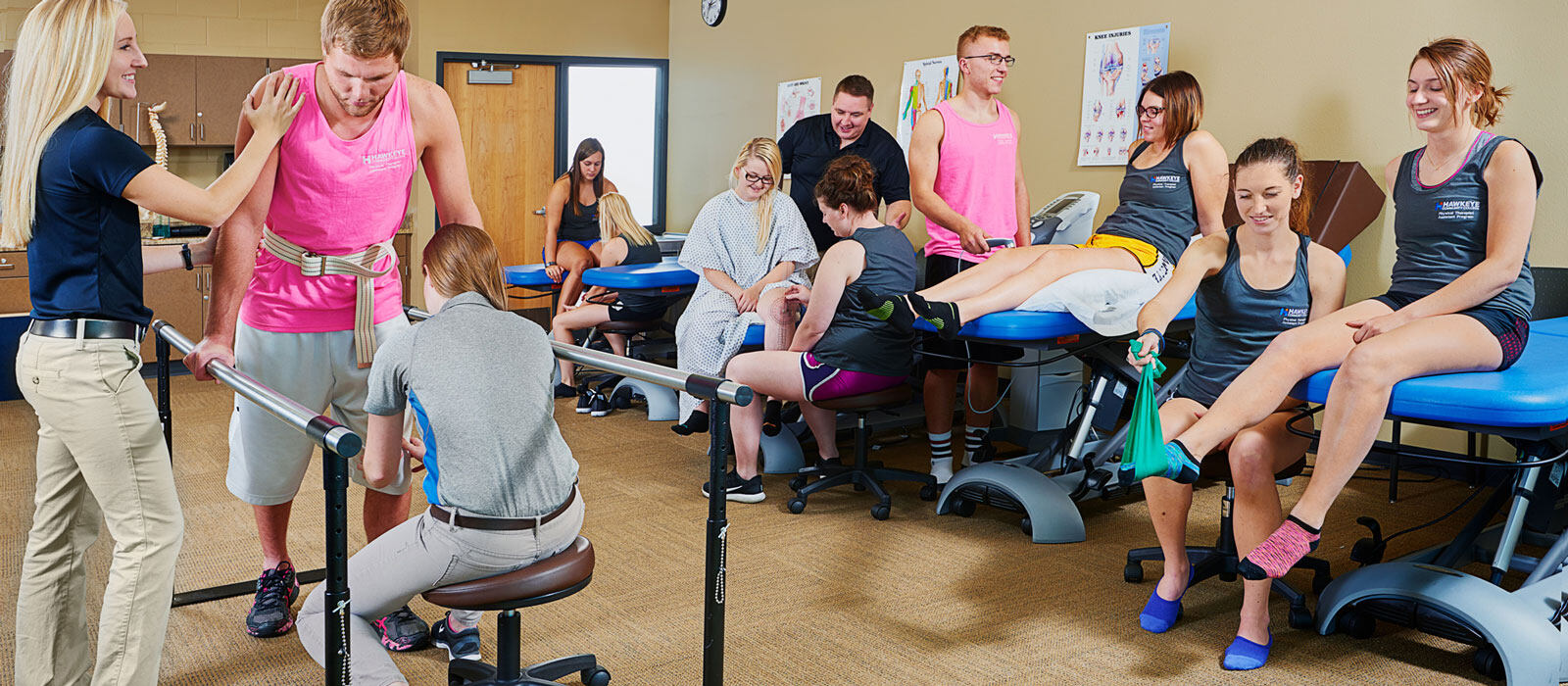
Physical therapy assistants play a crucial role in helping individuals recover from injuries, manage chronic pain, and regain their mobility. These professionals work alongside physical therapists, providing hands-on assistance, administering treatments, and offering support to patients throughout their rehabilitation journey.
Do you know what it takes to become a physical therapy assistant? In this article, we will uncover 18 astounding facts about physical therapy assistants that will leave you amazed. From the education and training required to the wide range of responsibilities they handle, you will gain a deeper understanding of the important role these professionals play in the field of healthcare.
So, get ready to delve into the fascinating world of physical therapy assistants and discover some incredible insights about this profession that you may not have known before!
Key Takeaways:
- Physical therapy assistants help patients recover from injuries, manage pain, and improve mobility. They also educate on injury prevention and promote overall wellness, making a significant impact on people’s lives.
- Physical therapy assistants work closely with patients, collaborate with healthcare professionals, and play a vital role in various healthcare settings. Their dedication and expertise contribute to enhancing patients’ quality of life.
Physical Therapy Assistants Play a Vital Role in Patient Rehabilitation
Physical therapy assistants are essential members of the healthcare team who assist physical therapists in providing rehabilitation services to patients. They work closely with patients to implement treatment plans and help them regain mobility and strength.
Physical Therapy Assistants Help Alleviate Pain
One of the key responsibilities of physical therapy assistants is to help manage and reduce pain for patients. Through various techniques such as manual therapy, therapeutic exercises, and modalities, they aid in the relief of pain and discomfort.
Physical Therapy Assistants Provide Support During Therapy Sessions
During therapy sessions, physical therapy assistants work alongside physical therapists to provide support and assistance to patients. They guide patients in performing exercises, monitor their progress, and ensure proper technique and form.
Physical Therapy Assistants Help Improve Range of Motion
Physical therapy assistants work with patients to improve their range of motion. Through stretching exercises, joint mobilizations, and other therapeutic techniques, they help patients increase their flexibility and regain functional movement.
Physical Therapy Assistants Educate Patients on Injury Prevention
In addition to providing rehabilitation services, physical therapy assistants also play a role in educating patients on injury prevention. They teach patients proper body mechanics, posture, and techniques to avoid further injury or re-injury.
Physical Therapy Assistants Work in Various Healthcare Settings
Physical therapy assistants can work in a variety of healthcare settings, including hospitals, outpatient clinics, rehabilitation centers, and nursing homes. Their flexible skills allow them to adapt to different environments and patient populations.
Physical Therapy Assistants Assist with Rehabilitation for Different Conditions
Physical therapy assistants assist in the rehabilitation of patients with various conditions, such as musculoskeletal injuries, neurological disorders, cardiac conditions, and respiratory diseases. They adapt treatments to meet the specific needs of each patient.
Physical Therapy Assistants Help Enhance Quality of Life
By assisting patients in their journey to recovery and helping them regain their independence, physical therapy assistants contribute to enhancing patients’ overall quality of life. They empower patients to perform daily activities with improved functionality and reduced pain.
Physical Therapy Assistants Need Strong Communication Skills
Effective communication is crucial for physical therapy assistants. They need to collaborate with patients, physical therapists, and other healthcare professionals to ensure proper treatment planning and monitor patients’ progress.
Physical Therapy Assistants Must Stay Updated with Evolving Practices
As the field of physical therapy evolves, it is essential for physical therapy assistants to stay updated with new practices and techniques. Continuing education and professional development are crucial for maintaining their skills and knowledge.
Physical Therapy Assistants Practice Ethical Conduct
Physical therapy assistants adhere to a strict code of ethics in their practice. They prioritize patient safety, confidentiality, and respect, always acting in the best interest of their patients.
Physical Therapy Assistants Collaborate with Other Healthcare Professionals
Physical therapy assistants work in collaboration with other healthcare professionals, including physicians, occupational therapists, and speech therapists, to provide comprehensive and coordinated care for patients.
Physical Therapy Assistants Assist in Pediatric Rehabilitation
Physical therapy assistants play a crucial role in pediatric rehabilitation, helping children with developmental delays, congenital disabilities, or injuries achieve their maximum physical potential.
Physical Therapy Assistants Help Athletes Recover from Injuries
In the sports field, physical therapy assistants contribute to the recovery and rehabilitation of athletes who have suffered injuries. They develop specialized treatment plans to help athletes regain optimal functioning and return to their sports.
Physical Therapy Assistants Promote Overall Wellness
Physical therapy assistants go beyond rehabilitation and focus on promoting overall wellness. They educate patients on maintaining an active and healthy lifestyle, emphasizing the importance of exercise, nutrition, and self-care.
Physical Therapy Assistants Assist in Geriatric Care
With the aging population, physical therapy assistants play a vital role in geriatric care. They help older adults maintain their mobility and independence, manage chronic conditions, and prevent falls.
Physical Therapy Assistants Enjoy a Rewarding Career
Being a physical therapy assistant is not only fulfilling but also offers career stability and growth opportunities. With the demand for rehabilitation services increasing, the role of physical therapy assistants remains essential in the healthcare industry.
Physical Therapy Assistants Make a Difference in People’s Lives
Above all, physical therapy assistants have the opportunity to make a positive impact on individuals’ lives. Through their dedication and expertise, they help patients overcome challenges, regain function, and experience a higher quality of life.
Conclusion
In conclusion, the role of a physical therapy assistant is not only important but also fascinating. From helping patients regain mobility to working alongside physical therapists, their contributions are crucial in the field of rehabilitation. The knowledge and skills they possess allow them to make a significant impact on improving the quality of life for individuals recovering from injuries or dealing with physical limitations. With a strong foundation in anatomy, physiology, and therapeutic techniques, physical therapy assistants play a vital role in the healthcare system. If you are considering a career in this field, rest assured that you are entering a rewarding and impactful profession where you can make a difference in the lives of others every day.
FAQs
1. What is a physical therapy assistant?
A physical therapy assistant is a trained healthcare professional who works under the supervision of a physical therapist to provide rehabilitative services to patients. They assist in implementing treatment plans, monitoring progress, and providing support during therapy sessions.
2. What qualifications does a physical therapy assistant need?
To become a physical therapy assistant, one must complete an accredited associate degree program. Additionally, they must pass a licensing exam to practice in their respective state. Strong communication, empathy, and physical stamina are also beneficial qualities for this profession.
3. What tasks does a physical therapy assistant perform?
A physical therapy assistant performs a range of tasks, including assisting patients with therapeutic exercises, applying therapeutic modalities, educating patients on adaptive equipment, and documenting progress. They also provide emotional support and motivation to patients throughout their rehabilitation journey.
4. What settings do physical therapy assistants work in?
Physical therapy assistants can work in various settings, including hospitals, rehabilitation centers, nursing homes, private clinics, and schools. They may also provide home-based therapy services.
5. Can physical therapy assistants specialize in a specific area?
Yes, physical therapy assistants can specialize in specific areas such as orthopedics, neurology, pediatrics, geriatrics, or sports medicine. Specialization can provide opportunities to work with specific patient populations and gain expertise in particular treatment techniques.
6. Do physical therapy assistants have career growth opportunities?
Yes, physical therapy assistants can advance in their careers through continuing education, obtaining certifications, or pursuing higher degrees. They may also take on leadership roles or become educators in physical therapy assistant programs.
7. Is physical therapy assistant a physically demanding job?
Yes, physical therapy assistant can be physically demanding. They may need to assist patients in performing exercises, transfer individuals with mobility issues, and often spend extended periods standing or walking throughout the day.
8. Can physical therapy assistants work independently?
No, physical therapy assistants always work under the supervision of a licensed physical therapist. They collaborate closely with the physical therapist to ensure effective and safe patient care.
9. How does a physical therapy assistant contribute to patient care?
A physical therapy assistant plays a vital role in patient care by providing hands-on assistance during therapy sessions, monitoring and documenting progress, and offering emotional support. They help patients regain mobility, reduce pain, and improve functionality through individualized treatment plans.
10. How can I become a physical therapy assistant?
To become a physical therapy assistant, you need to complete an accredited associate degree program in physical therapy assisting. Once you graduate, you must pass the licensing exam to practice in your state. It is advisable to research local requirements and consult with educational institutions offering physical therapy assistant programs.
Physical therapy assistants are essential healthcare professionals who make a significant impact on patients' lives. Their specialized skills and dedication to helping others regain mobility, alleviate pain, and improve overall well-being are truly remarkable. If you found these astounding facts about physical therapy assistants captivating, you might also be interested in exploring more fascinating aspects of this rewarding career. From the unique challenges faced by physical therapist assistants to the innovative techniques they employ, there's always more to learn about this dynamic field.
Was this page helpful?
Our commitment to delivering trustworthy and engaging content is at the heart of what we do. Each fact on our site is contributed by real users like you, bringing a wealth of diverse insights and information. To ensure the highest standards of accuracy and reliability, our dedicated editors meticulously review each submission. This process guarantees that the facts we share are not only fascinating but also credible. Trust in our commitment to quality and authenticity as you explore and learn with us.


